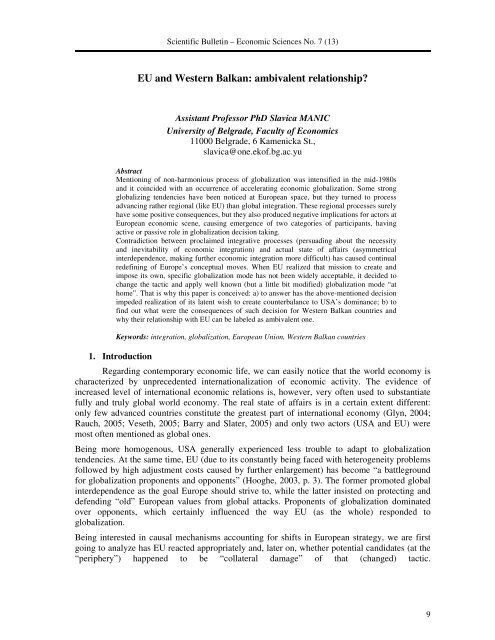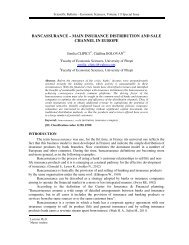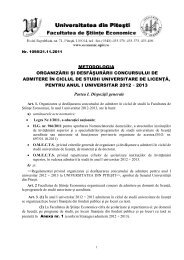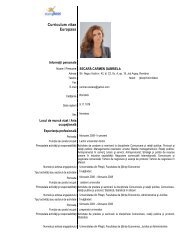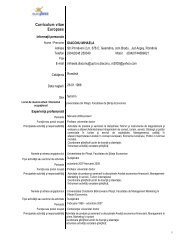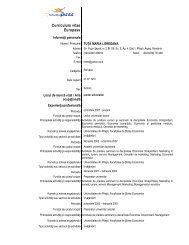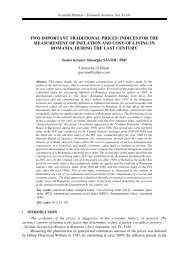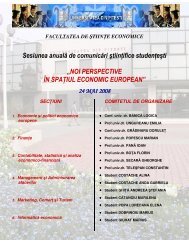buletin Åtiin ific - Facultatea de Stiinte Economice - Universitatea din ...
buletin Åtiin ific - Facultatea de Stiinte Economice - Universitatea din ...
buletin Åtiin ific - Facultatea de Stiinte Economice - Universitatea din ...
- No tags were found...
You also want an ePaper? Increase the reach of your titles
YUMPU automatically turns print PDFs into web optimized ePapers that Google loves.
Scient<strong>ific</strong> Bulletin – Economic Sciences No. 7 (13)EU and Western Balkan: ambivalent relationship?Assistant Professor PhD Slavica MANICUniversity of Belgra<strong>de</strong>, Faculty of Economics11000 Belgra<strong>de</strong>, 6 Kamenicka St.,slavica@one.ekof.bg.ac.yuAbstractMentioning of non-harmonious process of globalization was intensified in the mid-1980sand it coinci<strong>de</strong>d with an occurrence of accelerating economic globalization. Some strongglobalizing ten<strong>de</strong>ncies have been noticed at European space, but they turned to processadvancing rather regional (like EU) than global integration. These regional processes surelyhave some positive consequences, but they also produced negative implications for actors atEuropean economic scene, causing emergence of two categories of participants, havingactive or passive role in globalization <strong>de</strong>cision taking.Contradiction between proclaimed integrative processes (persua<strong>din</strong>g about the necessityand inevitability of economic integration) and actual state of affairs (asymmetricalinter<strong>de</strong>pen<strong>de</strong>nce, making further economic integration more difficult) has caused continualre<strong>de</strong>fining of Europe’s conceptual moves. When EU realized that mission to create andimpose its own, spec<strong>ific</strong> globalization mo<strong>de</strong> has not been wi<strong>de</strong>ly acceptable, it <strong>de</strong>ci<strong>de</strong>d tochange the tactic and apply well known (but a little bit modified) globalization mo<strong>de</strong> “athome”. That is why this paper is conceived: a) to answer has the above-mentioned <strong>de</strong>cisionimpe<strong>de</strong>d realization of its latent wish to create counterbalance to USA’s dominance; b) tofind out what were the consequences of such <strong>de</strong>cision for Western Balkan countries andwhy their relationship with EU can be labeled as ambivalent one.Keywords: integration, globalization, European Union, Western Balkan countries1. IntroductionRegar<strong>din</strong>g contemporary economic life, we can easily notice that the world economy ischaracterized by unprece<strong>de</strong>nted internationalization of economic activity. The evi<strong>de</strong>nce ofincreased level of international economic relations is, however, very often used to substantiatefully and truly global world economy. The real state of affairs is in a certain extent different:only few advanced countries constitute the greatest part of international economy (Glyn, 2004;Rauch, 2005; Veseth, 2005; Barry and Slater, 2005) and only two actors (USA and EU) weremost often mentioned as global ones.Being more homogenous, USA generally experienced less trouble to adapt to globalizationten<strong>de</strong>ncies. At the same time, EU (due to its constantly being faced with heterogeneity problemsfollowed by high adjustment costs caused by further enlargement) has become “a battlegroundfor globalization proponents and opponents” (Hooghe, 2003, p. 3). The former promoted globalinter<strong>de</strong>pen<strong>de</strong>nce as the goal Europe should strive to, while the latter insisted on protecting and<strong>de</strong>fen<strong>din</strong>g “old” European values from global attacks. Proponents of globalization dominatedover opponents, which certainly influenced the way EU (as the whole) respon<strong>de</strong>d toglobalization.Being interested in causal mechanisms accounting for shifts in European strategy, we are firstgoing to analyze has EU reacted appropriately and, later on, whether potential candidates (at the“periphery”) happened to be “collateral damage” of that (changed) tactic.9


